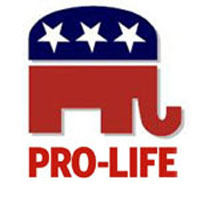The recently released report by the College Republican National Committee entitled “A Grand Old Party for a Brand New Generation” has received plenty of media attention in recent days, including from NRO’s Katrina Trinko. Overall, it is an impressive piece of work. The report does a nice job analyzing data from focus groups and public-opinion polls. It contains a number of thoughtful suggestions about how the Republican party can better engage young voters.
The policy section was especially interesting. Unlike many mainstream-media pundits, the authors of the report did not simply state that Republican candidates need to adopt liberal positions on various social issues. Instead, they researched the opinions of young adults on a range of public-policy issues including the role of government, foreign policy, immigration, abortion, and same-sex marriage.
 The section on abortion was particularly thoughtful. The authors cited two separate polls both of which found that a majority of young voters lean toward either banning or restricting abortion. The authors said that Republicans do not need to change their position, but they do need to focus more on messaging. During the 2012 election cycle there was too much emphasis on unpopular aspects of the Republican party’s stance on abortion. Furthermore, talk of defunding Planned Parenthood made some young voters feel uncomfortable.
The section on abortion was particularly thoughtful. The authors cited two separate polls both of which found that a majority of young voters lean toward either banning or restricting abortion. The authors said that Republicans do not need to change their position, but they do need to focus more on messaging. During the 2012 election cycle there was too much emphasis on unpopular aspects of the Republican party’s stance on abortion. Furthermore, talk of defunding Planned Parenthood made some young voters feel uncomfortable.
This advice on abortion might be wiser than the authors of the report realize. The opinions of young adults on the issue of abortion tend to be nuanced. Many polls show that young people are somewhat less likely than older Americans to describe themselves as “pro-life.” However, there is a growing body of data showing that young adults are actually more likely than older voters to support limiting abortion in specific circumstances.
This can be demonstrated several ways. The General Social Survey (GSS) has been collecting opinion data on abortion using the exact same battery of questions since the 1970s. In most years, respondents between the ages of 18 and 29 tend to be the least sympathetic toward the pro-life position. However, since 2000 the General Social Survey (GSS) has consistently found that young adults, ages 18 to 29 are more comfortable restricting abortion in certain circumstances than are older Americans.
Other recent polls have found similar results. Last summer, the National Right to Life Committee commissioned a poll which showed that young adults ages 18 to 44 were actually more likely to favor the Pain-Capable Unborn Child Protection Act, which would ban abortion after 22 weeks of gestation. This January the Chiaroscuro Foundation commissioned a poll on the abortion attitudes of New York residents. The Chiaroscuro survey found that adults under 40 were statistically more likely to support waiting periods, parental-involvement laws, and providing information about options and risks to pregnant women prior to the abortion.
Finally, Students for Life of America (SFLA) commissioned a professional survey on the abortion attitudes of young adults ages 18 to 24. A full 44 percent of respondents in the SFLA survey thought that abortions should either be illegal or only legal in cases f rape, incest, or life of the mother. This is comparable to the 45 percent who thought abortion should be legal in a wider range of circumstances (The rest were unsure or declined to state an opinion).
CLICK LIKE IF YOU’RE PRO-LIFE!
Much of the media narrative about the College Republicans report involves its discussion about same-sex marriage. The authors candidly acknowledge that the same-sex marriage issue poses a challenge — though not an insurmountable challenge — for Republican candidates who are trying to attract young voters. However, the authors of the report deserve credit for handling the abortion issue in a thoughtful, sensitive, and detailed manner.
LifeNews.com Note: Dr. Michael New is a political science professor at the University of Michigan–Dearborn and holds a Ph.D. from Stanford University. He is a fellow at Witherspoon Institute in Princeton, New Jersey.







